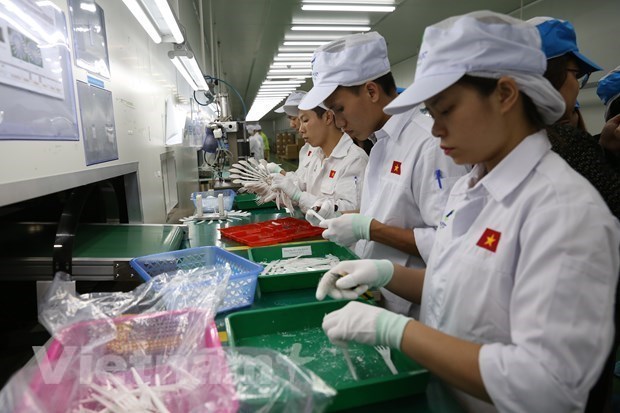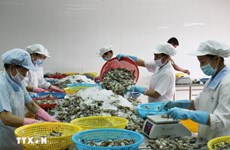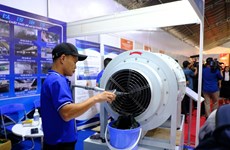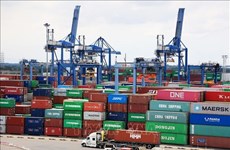Vietnam among top destinations for ASEAN firms planning intra-bloc business expansion
The leader of Standard Chartered Vietnam said the country continues to offer appealing business and investment opportunities given its strong fundamentals, including low labour costs, an abundant workforce, and strategic location.
 Illustrative image (Photo: VietnamPlus)
Illustrative image (Photo: VietnamPlus)According to the survey, 80 percent of the respondents are focusing on expanding in Singapore to capture sales and production opportunities. The city-state is followed by Thailand (60 percent), Vietnam (59 percent), Indonesia (52 percent), Malaysia (49 percent), and the Philippines (27 percent).
Michele Wee, CEO of Standard Chartered Vietnam, said Vietnam continues to offer appealing business and investment opportunities given its strong fundamentals – robust economic growth, a sizeable domestic market, low labour costs, an abundant workforce, free trade agreements, and strategic location.
She said as an international bank with 117 years of history in Vietnam, Standard Chartered has deep local knowledge to support internationalising companies’ cross-border growth aspiration and provide them with the right solutions that meet their financing and operational needs.
In its report, Standard Chartered said ASEAN’s rising middle class and increasingly well-educated workforce, coupled with its supply of natural resources, rapid urbanisation, and growing infrastructure spend provides a strong foundation for future growth. Not only is ASEAN highly connected through free-trade agreements with major global trading partners such as the US, China and Europe but there is also significant focus on intra-ASEAN trade and investments – opening doors to new growth opportunities for companies in the region.
ASEAN companies are found to be highly optimistic about intra-regional growth over the next 12 months.
The majority of ASEAN enterprises focusing on intra-regional opportunities expect robust business growth in the region over the next 12 months, as seen in 99 percent of respondents expecting growth in production and 96 percent anticipating growth in revenue.
Access to the large and growing ASEAN consumer market (69 percent), access to a global market enabled by a network of Free Trade Agreements (59 percent) and availability of abundant and skilled workforce (49 percent) were among the most important drivers for expansion across the region, according to senior executives of the surveyed ASEAN companies.
In addition, with the Regional Comprehensive Economic Partnership (RCEP) expected to attract more investments to ASEAN, all respondents said that they are planning to increase their investments over the next 3 - 5 years.
Meanwhile, the top three risks in the region are identified as the COVID-19 pandemic or other health crises (75 percent), geopolitical uncertainty and trade conflicts (60 percent), and the slow revival of the economy and the drop in consumer spending (49 percent).
Furthermore, the respondents also agreed that adapting their business model to industry practices and conditions within ASEAN (67 percent), building relationships with suppliers and adapting supply chain logistics (66 percent), as well as understanding regional regulations, payment methods and infrastructure (53 percent) are the most significant challenges they anticipate in the next 6 - 12 months.
To drive resilient and rebalanced growth in ASEAN and to mitigate these risks and challenges, the surveyed executives identified entering new partnerships/joint ventures to increase market presence (53 percent), driving sustainability and ESG (Environment, Social and Governance) initiatives (53 percent), and executing digital transformation programmes (52 percent) as the most important areas for their companies to focus on.
To support growth in ASEAN, the respondents said they are seeking banking partners that have strong cash management capabilities (52 percent), one-stop corporate financing and capital raising services (52 percent), and extensive trade financing services (47 percent), among others./.













